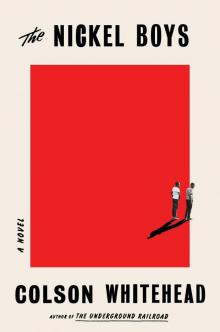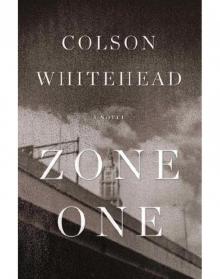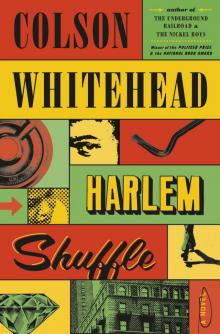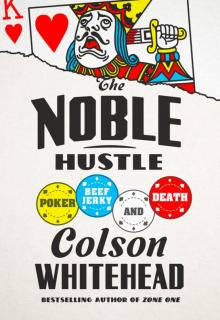- Home
- Colson Whitehead
The Underground Railroad Page 19
The Underground Railroad Read online
Page 19
Terrance received Ridgeway into the parlor. He was drunk and had not bothered to dress himself, lounging on the sofa in a red robe. It was tragic, Ridgeway said, to see the degeneration that can happen in just one generation, but money does that to a family sometimes. Brings out the impurities. Terrance remembered Ridgeway from his earlier visit, when Mabel disappeared into the swamp, just like this latest trio. He told Ridgeway that his father had been touched that he came in person to apologize for his incompetence.
“I could have slapped the Randall boy twice across the face without losing the contract,” Ridgeway said. “But in my mature years I decided to wait until I had you and the other one in hand. Something to look forward to.” He assumed from Terrance’s eagerness and the size of the bounty that Cora was her master’s concubine.
Cora shook her head. She had stopped sobbing and stood now, her trembling under control, hands in fists.
Ridgeway paused. “Something else, then. At any rate, you exert a powerful influence.” He resumed the story of his visit to Randall. Terrance briefed the slave catcher on the state of affairs since Lovey’s capture. Just that morning his man Connelly had been informed that Caesar frequented the premises of a local shopkeeper—the man sold the nigger boy’s woodwork, supposedly. Perhaps the slave catcher might visit this Mr. Fletcher and see what developed. Terrance wanted the girl alive but didn’t care how the other one came back. Did Ridgeway know that the boy came from Virginia originally?
Ridgeway did not. This was some sort of jousting about his home state. The windows were closed and yet a disagreeable smell had moved into the room.
“That’s where he learned his bad habits,” Terrance had said. “They’re soft up there. You make sure he learns how we do things in Georgia.” He wanted the law kept out of it. The pair was wanted for the murder of a white boy and wouldn’t make it back once the mob got wind. The bounty accounted for his discretion.
The slave catcher took his leave. The axle of his empty wagon complained, as it did when there was no weight to quiet it. Ridgeway promised himself it would not be empty when he returned. He wasn’t going to apologize to another Randall, certainly not that whelp who ran the place now. He heard a sound and turned back to the house. It came from the girl, Lovey. Her arm fluttered. She was not dead after all. “Lingered another half day, from what I heard.”
Fletcher’s lies collapsed immediately—one of those weak religious specimens—and he relinquished the name of his associate on the railroad, a man named Lumbly. Of Lumbly there was no sign. He never returned after taking Cora and Caesar out of state. “To South Carolina was it?” Ridgeway asked. “Was he also the one who conveyed your mother north?”
Cora kept her tongue. It was not hard to envision Fletcher’s fate, and perhaps his wife’s as well. At least Lumbly made it out. And they hadn’t discovered the tunnel beneath the barn. One day another desperate soul might use that route. To a better outcome, fortune willing.
Ridgeway nodded. “No matter. We have plenty of time to catch each other up. It’s a long ride to Missouri.” The law had caught up with a station master in southern Virginia, he said, who gave up the name of Martin’s father. Donald was dead, but Ridgeway wanted to get a sense of the man’s operation if he could, to understand the workings of the larger conspiracy. He hadn’t expected to find Cora but had been utterly delighted.
Boseman chained her to the wagon. She knew the sound of the lock now. It hitched for a moment before falling into place. Jasper joined them the next day. His body shivered like that of a beaten dog. Cora tried to engage him, asking after the place he fled, the business of working cane, how he took flight. Jasper responded with hymns and devotions.
—
THAT was four days ago. Now she stood in a black pasture in bad-luck Tennessee, crunching burned wood beneath her feet.
The wind picked up, and the rain. Their stop was over. Homer cleaned after their meal. Ridgeway and Boseman tapped out their pipes and the younger man whistled for her to return. Tennessee hills and mountains rose around Cora like the sides of a black bowl. How awful the flames must have been, how fierce, to make such ruin. We’re crawling in a bowl of ashes. What’s left when everything worthwhile has been consumed, dark powder for the wind to take.
Boseman slid her chains through the ring in the floor and secured them. Ten rings were bolted to the wagon floor, two rows of five, enough for the occasional big haul. Enough for these two. Jasper claimed his favorite spot on the bench, crooning with vigor, as if he’d just gobbled down a Christmas feast. “When the Savior calls you up, you’re going to lay the burden down, lay that burden down.”
“Boseman,” Ridgeway said softly.
“He’s going to look in your soul and see what you done, sinner, He’s going to look in your soul and see what you done.”
Boseman said, “Oh.”
The slave catcher got into the wagon for the first time since he picked up Cora. He held Boseman’s pistol in his hand and shot Jasper in the face. The blood and the bone covered the inside of the canopy, splashing Cora’s filthy shift.
Ridgeway wiped his face and explained his reasoning. Jasper’s reward was fifty dollars, fifteen of that for the tinker who brought the fugitive to jail. Missouri, back east, Georgia—it would be weeks before they delivered the man to his owner. Divide thirty-five dollars by, say, three weeks, minus Boseman’s share, and the lost bounty was a very small price to pay for silence and a restful mind.
Homer opened his notebook and checked his boss’s figures. “He’s right,” he said.
Tennessee proceeded in a series of blights. The blaze had devoured the next two towns on the cindered road. In the morning the remains of a small settlement emerged around a hill, an arrangement of scorched timber and black stonework. First came the stumps of the houses that had once contained the dreams of pioneers, and then the town proper in a line of ruined structures. The town farther along was larger but its rival in destruction. The heart was a broad intersection where ravaged avenues had converged in enterprise, now gone. A baker’s oven in the ruins of the shop like a grim totem, human remains bent behind the steel of a jail cell.
Cora couldn’t tell what feature of the landscape had persuaded the homesteaders to plant their futures, fertile earth or water or vistas. Everything had been erased. If the survivors returned it would be to confirm the resolution to try again somewhere else, scurrying back east or ever west. No resurrection here.
Then they escaped the wildfire’s reach. The birches and wild grasses vibrated with impossible color after their time in the burned land, Edenic and fortifying. In jest, Boseman imitated Jasper’s singing, to mark the change in mood; the black scenery had worked on them more than they knew. The robust corn in the fields, already two feet high, pointed to an exuberant harvest; with equal force the ruined territory had advertised reckonings to come.
Ridgeway called for a stop shortly after noon. The slave catcher stiffened as he read aloud the sign at the crossroads. The town up the road was overcome by yellow fever, he said. All travelers warned away. An alternative trail, smaller and uneven, led southwest.
The sign was new, Ridgeway observed. Most likely the sickness had not run its course.
“My two brothers passed of yellow fever,” Boseman said. He grew up on the Mississippi, where the fever liked to visit when the weather turned warm. His younger brothers’ skin turned jaundiced and waxen, they bled from their eyes and asses and seizures wracked their tiny bodies. Some men took away their corpses in a squeaky wheelbarrow. “It’s a miserable death,” he said, his jokes taken from him again.
Ridgeway knew the town. The mayor was a corrupt boor, the food turned your guts runny, but he held a good thought for them. Going around would add considerable time to their trip. “The fever comes on the boats,” Ridgeway said. From the West Indies, all the way from the dark continent, following in the wake of trade. “It’s a human tax on progress.”
“Who’s the taxman came to collect it?” Boseman
said. “I never saw him.” His fear made him skittish and petulant. He didn’t want to linger, even this crossroads too close to the fever’s embrace. Not waiting for Ridgeway’s order—or obeying a signal shared only by the slave catcher and the boy secretary—Homer drove the wagon away from the doomed town.
Two more signs along the southwesterly course maintained the warning. The trails feeding into the quarantined towns displayed no sign of the danger ahead. Traveling through the handiwork of the fire for so long made an unseeable menace more terrifying. It was a long time, after dark, before they stopped again. Time enough for Cora to take stock of her journey from Randall and make a thick braid of her misfortunes.
List upon list crowded the ledger of slavery. The names gathered first on the African coast in tens of thousands of manifests. That human cargo. The names of the dead were as important as the names of the living, as every loss from disease and suicide—and the other mishaps labeled as such for accounting purposes—needed to be justified to employers. At the auction block they tallied the souls purchased at each auction, and on the plantations the overseers preserved the names of workers in rows of tight cursive. Every name an asset, breathing capital, profit made flesh.
The peculiar institution made Cora into a maker of lists as well. In her inventory of loss people were not reduced to sums but multiplied by their kindnesses. People she had loved, people who had helped her. The Hob women, Lovey, Martin and Ethel, Fletcher. The ones who disappeared: Caesar and Sam and Lumbly. Jasper was not her responsibility, but the stains of his blood on the wagon and her clothes might as well have represented her own dead.
Tennessee was cursed. Initially she assigned the devastation of Tennessee—the blaze and the disease—to justice. The whites got what they deserved. For enslaving her people, for massacring another race, for stealing the very land itself. Let them burn by flame or fever, let the destruction started here rove acre by acre until the dead have been avenged. But if people received their just portion of misfortune, what had she done to bring her troubles on herself? In another list, Cora marked the decisions that led her to this wagon and its iron rings. There was the boy Chester, and how she had shielded him. The whip was the standard punishment for disobedience. Running away was a transgression so large that the punishment enveloped every generous soul on her brief tour of freedom.
Bouncing on the wagon springs, she smelled the damp earth and the heaving trees. Why had this field escaped while another burned five miles back? Plantation justice was mean and constant, but the world was indiscriminate. Out in the world, the wicked escaped comeuppance and the decent stood in their stead at the whipping tree. Tennessee’s disasters were the fruit of indifferent nature, without connection to the crimes of the homesteaders. To how the Cherokee had lived their lives.
Just a spark that got away.
No chains fastened Cora’s misfortunes to her character or actions. Her skin was black and this was how the world treated black people. No more, no less. Every state is different, Lumbly said. If Tennessee had a temperament, it took after the dark personality of the world, with a taste for arbitrary punishment. No one was spared, regardless of the shape of their dreams or the color of their skin.
A young man with curly brown hair, pebbly eyes dark beneath his straw hat, drove a team of workhorses from the west. His cheeks were sunburned a painful red. He intercepted Ridgeway’s gang. A big settlement lay ahead, the man said, with a reputation for a rambunctious spirit. Free of yellow fever as of that morning. Ridgeway told the man what lay ahead of him and gave his thanks.
Immediately the traffic on the road resumed, even the animals and insects contributing activity. The four travelers were returned to the sights and sounds and smells of civilization. On the outskirts of the town, lamps glowed in the farmhouses and shacks, the families settling in for the evening. The town rose into view, the biggest Cora had seen since North Carolina, if not as long established. The long main street, with its two banks and the loud row of taverns, was enough to bring her back to the days of the dormitory. The town gave no indication of quieting for the night, shops open, citizens a-prowl on the wooden sidewalks.
Boseman was adamant about not spending the night. If the fever was so close it might strike here next, perhaps it already churned in the bodies of the townspeople. Ridgeway was irritated but gave in, even though he missed a proper bed. They’d camp up the road after they resupplied.
Cora remained chained to the wagon as the men pursued errands. Strollers caught her face through the openings in the canvas and looked away. They had hard faces. Their clothes were coarse and homespun, less fine than the white people’s clothes in the eastern towns. The clothes of settlers, not of the settled.
Homer climbed in the wagon whistling one of Jasper’s more monotonous ditties. The dead slave still among them. The boy held a bundle wrapped in brown paper. “This is for you,” he said.
The dress was dark blue with white buttons, soft cotton that gave off a medicinal smell. She held up the dress so that it blocked the blood stains on the canvas, which were stark on the fabric from the streetlamps outside.
“Put it on, Cora,” Homer said.
Cora raised her hands, the chains making a noise.
He unlocked her ankles and wrists. As she did every time, Cora considered the chances of escape and came up with the dead result. A town like this, rough and wild, made good mobs, she figured. Had news of the boy in Georgia reached here? The accident she never thought about and which she didn’t include in her list of transgressions. The boy belonged on his own list—but what were its terms?
Homer watched her as she dressed, like a valet who had waited on her since the cradle.
“I’m caught,” Cora said. “You choose to be with him.”
Homer looked puzzled. He took out his notebook, turned to the last page, and scribbled. When he was finished, the boy fixed her manacles again. He gave her ill-fitting wooden shoes. He was about to chain Cora to the wagon when Ridgeway said to bring her outside.
Boseman was still out after a barber and a bath. The slave catcher handed Homer the gazettes and the fugitive bulletins he’d collected from the deputy in the jail. “I’m taking Cora for some supper,” Ridgeway said, and led her into the racket. Homer dropped her filthy shift into the gutter, the brown of the dried blood seeping into the mud.
The wooden shoes pinched. Ridgeway didn’t alter his stride to accommodate Cora’s hindered pace, walking ahead of her and unconcerned that she might run. Her chains were a cowbell. The white people of Tennessee took no notice of her. A young negro leaned against the wall of a stable, the only person to register her presence. A freeman from his appearance, dressed in striped gray trousers and a vest of cowhide. He watched her move as she had watched the coffles trudge past Randall. To see chains on another person and be glad they are not your own—such was the good fortune permitted colored people, defined by how much worse it could be any moment. If your eyes met, both parties looked away. But this man did not. He nodded before passersby took him from view.
Cora had peeked inside Sam’s saloon in North Carolina but never crossed the threshold. If she was an odd vision in their midst, one look from Ridgeway made the patrons return to their own business. The fat man tending the bar rolled tobacco and stared at the back of Ridgeway’s head.
Ridgeway led her to a wobbly table against the rear wall. The smell of stewed meat rose above that of the old beer soaked into the floorboards and the walls and the ceiling. The pigtailed maid was a broad-shouldered girl with the thick arms of a cotton loader. Ridgeway ordered their food.
“The shoes were not my first choice,” he told Cora, “but the dress suits you.”
“It’s clean,” Cora said.
“Now, well. Can’t have our Cora looking like the floor of a butcher’s shop.”
He meant to elicit a reaction. Cora declined. From the saloon next door, a piano started up. It sounded as if a raccoon ran back and forth, mashing on the keys.
�
��All this time you haven’t asked about your accomplice,” Ridgeway said. “Caesar. Did it make the newspapers up in North Carolina?”
This was going to be a performance then, like one of the Friday-night pageants on the park. He had her dress up for night at the theater. She waited.
“It’s so strange going to South Carolina,” Ridgeway said, “now that they have their new system. Had many a caper there in the old days. But the old days aren’t that far off. For all their talk of negro uplift and civilizing the savage, it’s the same hungry place it always was.”
The maid delivered bread heels and bowls full of beef and potato stew. Ridgeway whispered to her while looking at Cora, something she couldn’t hear. The girl laughed. Cora realized he was drunk.
Ridgeway slurped. “We caught up with it at the factory at the end of its shift,” he said. “These big colored bucks around it, finding their old fear again after thinking they’d put it behind them. At first, wasn’t no big fuss. Another runaway caught. Then word spread that Caesar was wanted for the murder of a little boy—”
“Not little,” Cora said.
Ridgeway shrugged. “They broke into the jail. The sheriff opened the door, to be honest, but that’s not as dramatic. They broke into the jail and ripped its body to pieces. The decent people of South Carolina with their schoolhouses and Friday credit.”
News of Lovey had broken her down in front of him. Not this time. She was prepared—his eyes brightened when he was on the verge of a cruelty. And she had known Caesar was dead for a long time now. No need to ask after his fate. It appeared before her one night in the attic like a spark, a small and simple truth: Caesar did not make it out. He was not up north wearing a new suit, new shoes, new smile. Sitting in the dark, nestled into the rafters, Cora understood that she was alone again. They had got him. She had finished mourning him by the time Ridgeway came knocking on Martin’s door.

 The Nickel Boys
The Nickel Boys Zone One
Zone One The Underground Railroad
The Underground Railroad The Colossus of New York
The Colossus of New York The Intuitionist
The Intuitionist Apex Hides the Hurt
Apex Hides the Hurt Harlem Shuffle
Harlem Shuffle The Noble Hustle
The Noble Hustle